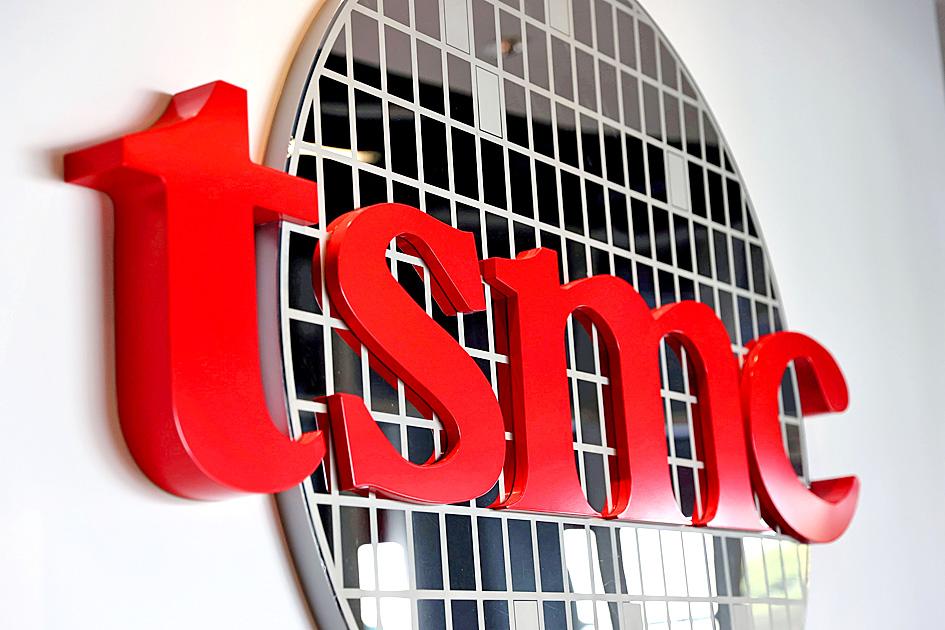Taiwan Semiconductor Manufacturing Co (TSMC, 台積電), the world’s top chipmaker, would not give the US Department of Commerce confidential customer information, majority stakeholder the National Development Fund (國發基金) said yesterday.
National Development Council (NDC) Minister Kung Ming-hsin (龔明鑫), who oversees the fund and is a TSMC board director, told legislators at the Legislative Yuan in Taipei that although the chipmaker could provide the industry more insight into chip shortages during its quarterly board meeting, it is bound by confidentiality agreements not to disclose sensitive details.
US Secretary of Commerce Gina Raimondo on Thursday last week said that her agency was asking chip suppliers to fill out questionnaires by Nov. 8 to help it alleviate chip supply bottlenecks and identify possible hoarding.

Photo: Reuters
Legislators were seeking to know if TSMC could be forced by the US to surrender confidential information, such as a customer list, chip inventory and production plans, which would compromise its technology and business.
Kung said he would seek to better understand the situation before forming an opinion on the nature of the US’ requests.
The council later released a statement saying that the requests are aimed at all companies in the semiconductor supply chain, not just TSMC, and that response is voluntary.
Companies can decide whether the questions encroach on confidential agreements, the council said, adding that TSMC has indicated it would not reveal any commercial secrets.
TSMC said the government has been supporting the company, adding that it would seek additional government help if needed.
As the world’s No. 1 pure foundry service provider, TSMC makes chips and builds capacity according to customers’ demands, meaning that it does not stack inventory.
To alleviate global chip shortages, TSMC said it has taken “unprecedented actions to address this challenge.”
The chipmaker has increased output of microcontroller units — key components in automotive semiconductor products — by 60 percent from last year, it said.
The company made the remarks after participating in a White House meeting last week aimed at tackling chip crunch.
“Increasing demand visibility in this complex supply chain should be the path to avoid such shortages from happening,” the company said.
The chipmaker also said it is confident that its capacity expansion plan including an advanced 5-nanometer semiconductor fab in Phoenix, Arizona, would enable it to support the industry in driving long-term stability in semiconductor supplies.

Taiwan will prioritize the development of silicon photonics by taking advantage of its strength in the semiconductor industry to build another shield to protect the local economy, National Development Council (NDC) Minister Paul Liu (劉鏡清) said yesterday. Speaking at a meeting of the legislature’s Economics Committee, Liu said Taiwan already has the artificial intelligence (AI) industry as a shield, after the semiconductor industry, to safeguard the country, and is looking at new unique fields to build more economic shields. While Taiwan will further strengthen its existing shields, over the longer term, the country is determined to focus on such potential segments as

UNCERTAINTY: Innolux activated a stringent supply chain management mechanism, as it did during the COVID-19 pandemic, to ensure optimal inventory levels for customers Flat-panel display makers AUO Corp (友達) and Innolux Corp (群創) yesterday said that about 12 to 20 percent of their display business is at risk of potential US tariffs and that they would relocate production or shipment destinations to mitigate the levies’ effects. US tariffs would have a direct impact of US$200 million on AUO’s revenue, company chairman Paul Peng (彭雙浪) told reporters on the sidelines of the Touch Taiwan trade show in Taipei yesterday. That would make up about 12 percent of the company’s overall revenue. To cope with the tariff uncertainty, AUO plans to allocate its production to manufacturing facilities in

COLLABORATION: Given Taiwan’s key position in global supply chains, the US firm is discussing strategies with local partners and clients to deal with global uncertainties Advanced Micro Devices Inc (AMD) yesterday said it is meeting with local ecosystem partners, including Taiwan Semiconductor Manufacturing Co (TSMC, 台積電), to discuss strategies, including long-term manufacturing, to navigate uncertainties such as US tariffs, as Taiwan occupies an important position in global supply chains. AMD chief executive officer Lisa Su (蘇姿丰) told reporters that Taiwan is an important part of the chip designer’s ecosystem and she is discussing with partners and customers in Taiwan to forge strong collaborations on different areas during this critical period. AMD has just become the first artificial-intelligence (AI) server chip customer of TSMC to utilize its advanced

While China’s leaders use their economic and political might to fight US President Donald Trump’s trade war “to the end,” its army of social media soldiers are embarking on a more humorous campaign online. Trump’s tariff blitz has seen Washington and Beijing impose eye-watering duties on imports from the other, fanning a standoff between the economic superpowers that has sparked global recession fears and sent markets into a tailspin. Trump says his policy is a response to years of being “ripped off” by other countries and aims to bring manufacturing to the US, forcing companies to employ US workers. However, China’s online warriors